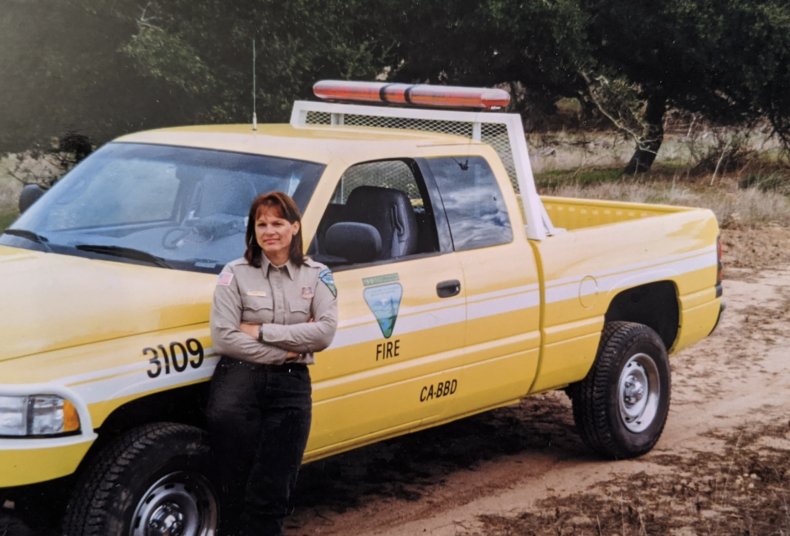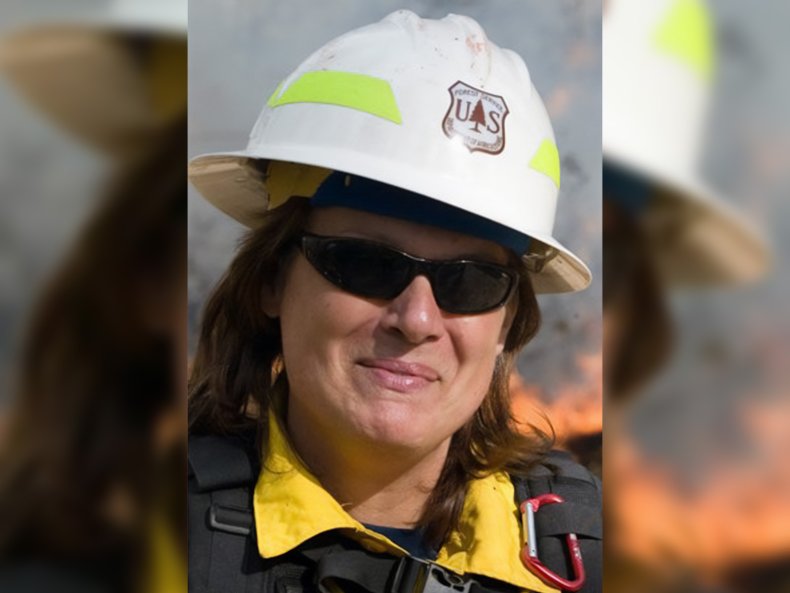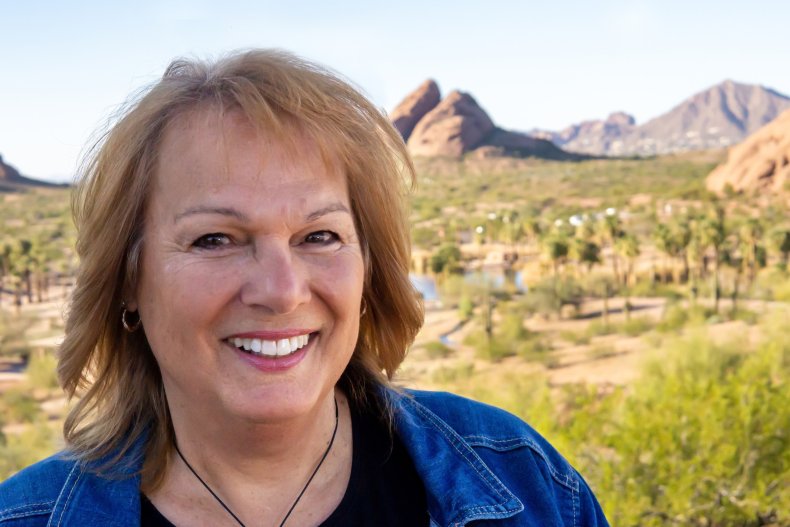Lately we’ve seen so much in the news about transgender and LGBTQ individuals and their rights. Of course, it’s not new to me: I’ve been dealing with the whole “trans thing” for a long time now. I’m 67, and because I realized at the age of 4 that I identified as a woman, I’ve been dealing with these issues for about 63 years.
I was a firefighter for 45 years. It’s been fun and exciting, and I’m thankful for all the experiences I’ve had. I’ve been fortunate to save the lives of hikers who fell from cliffs, fought large wildland fires throughout the United States, I’ve been sent to Australia, responded to hurricanes and even spent a month working in New York City following the September 11 attacks.
The 30 days I spent working at Ground Zero will be seared into my psyche. I was honored to have many male firefighters talk to me about what they’d seen and the traumas they’d experienced while I was working there at the pile. I think they felt more comfortable talking to a woman than they would have to another man. As a matter of fact, none of my male co-workers had the same experiences as I did regarding the cops and firefighters unburdening themselves about what happened to them when the towers came down.
It wasn’t the only time that being a woman in a predominantly male profession came with additional layers for me to navigate, both before and after I transitioned to female about 25 years ago. My transition took place over many years. It didn’t happen overnight.

Courtesy of Bobbie Scopa
Those co-workers who worked with me early in my career might have known something was different about me. But my transition spanned many years and multiple agencies in multiple locations. And it wasn’t anyone’s business. My intention was to be the best firefighter, then captain, then chief that I could be. My desire was to be respected and well thought of. Gender was not a part of this. Although I did have to deal with the same issues as any female firefighter.
One time, I was on a large wildland fire in Montana and in charge of a group of local loggers with heavy equipment like bulldozers and tree harvesters. They were a tough group and when they were assigned to work for me, they had plenty to say. Not to my face, but they were calling me “Baywatch” to each other behind my back because I was from California, drove a truck that looked like the kind they drove on the show and I was female. That’s how our work situation started.
When I found out that they were calling me “Baywatch” on their CB radios, I knew I had to assert myself. When the time was right, I gave them hell in the language that they were familiar with and cussed them out for not getting their work done. Normally I wouldn’t have cursed at a work subordinate. But I knew I needed to get their attention so I spoke in the local vernacular. Those loggers respected toughness so I had to ramp up my behavior.
For the next few weeks, those tough loggers worked closely with me. We went through many trials together fighting fire in a difficult and arduous fire environment. But we were successful and we were making progress on our portion of the fire. One afternoon a local administrator came out to my part of the fire and began to argue with me because he thought I was taking unnecessary actions that might cause some environmental damage.

Courtesy of Bobbie Scopa
Our argument got pretty heated and our voices were raised but when I saw the administrator and his assistant turn around and run back to their car, I had to look behind me to see what caused them to leave so hastily. Behind me were my loggers carrying steel rods and large sticks walking up towards us. They were ready to rumble in order to stand up for and protect me.
When my three week assignment was finished, I was to drive back to California and my home station. My loggers insisted that I meet them at their local bar in town the night before, so they could buy me a beer. Well, they didn’t just buy me a beer, I must have had at least 50 or 60 free beer tokens that my loggers had purchased and kept giving to me. I felt like a beloved boss, a friend, a respected colleague. I definitely felt like I belonged.
At the end of the evening when I had to get some sleep to be prepared for a long drive the next day, I finally sat down at the bar to relax. But when I lazily looked at the big mirror behind the bar with all the bottles lined up, what I saw kind of jerked me back to reality. What my eyes had focused on was a sign at the top of the mirror. It was a handmade wooden sign. It read “No Queers Allowed.” The irony wasn’t lost on me. What would their reaction have been if they knew my history?
Another time, after fighting a large fire in Wyoming, my coworkers and I were sitting in a bar waiting for our commercial flights back to the Pacific Northwest. As I sat in the bar, I was surrounded by a half dozen firefighting supervisors who worked for me and one who was my peer. He and I were both operations chiefs on our incident management team.
But during the previous two years, he had become a best friend of mine. He was one of my closest work friends I had ever had. We sat in that airport bar telling stories and recounting each of our adventures that had happened to us on the fire. The camaraderie was thick. The mutual respect for each other and the closeness that can only come from extended periods of intense work when you’re risking your lives together felt like these men were truly my brothers.
The conversation turned to my fellow operations chief. He had recently moved from a small town in Idaho and taken a position in a big city where the regional offices were. Our firefighting supervisors who worked for both of us wanted to know how my fellow operations chief was adapting to the big city. In his big booming voice and his country twang, he told our folks how it was kind of weird in the big city.
“Why just the other day, I saw one of them he-she’s walking around. You don’t see that stuff where I came from.” He must have used the term “he-she” a couple of times and it was like the sound of fingernails on a chalkboard.
I thought about what I should say or do. Should I speak up and tell him that the term “he-she” is disrespectful? Should I say, “You know, I’m transgender too.” I didn’t say anything. I didn’t want to spoil the moment of our team’s close bonding and I didn’t want to out myself. I was reveling in our team bonding and felt like I would ruin the moment. Could I have done better? Should I have done more? It’s up to me to decide if and when I will tell someone of my gender history. That can be exhausting.
I never “came out” to my colleagues unless I became close friends with them first. And that wasn’t common. Although some of my co-workers may already have known, it’s hard to say. So after all these years, why say something now? Why not keep my head down and just live my life as I have for the last 25 years?
It’s because I hear so much ignorance when it comes to transgender people. Even well meaning people can be ignorant. They just don’t know what they don’t know. That’s how ignorance works. If you know you don’t know something, you’re not likely to spout off like an expert and speak with authority on a subject you know little of.
In May this year, I was sitting on my patio with some friends and we were talking about the news and current events. A couple of my friends were aware of my past. A couple more didn’t know. I don’t bring it up unless it’s germane to the discussion. One of the women who I didn’t know very well commented on the news about trans kids. “Oh c’mon, four year old kids don’t know anything about gender. There’s no way a child knows whether they’re trans or not. No way.”

Bobbie Scopa
I felt like I was back at that bar in Wyoming with my co-workers. Except this time I was retired and had nothing to lose than possibly friendship or respect of a neighbor. So it was time to put up or shut up. “I knew,” I said. My neighbor looked at me and said, “You knew what?” I explained how I’m transgender and knew when I was three or four years old. I remember my age because I had gotten a new bed. And that’s when I started praying to God to fix me.
I don’t ever want to embarrass someone for saying something ignorant. Ignorant doesn’t mean they’re being mean or disrespectful. At least they aren’t unless someone tries to teach them and they refuse to learn. Then that’s a different story.
Most people don’t know the issues that I’ve dealt with my whole life relating to my gender. They don’t need to know. It’s none of their business. What I implore others to do is to be kind in words as well as actions. We don’t know what’s going on in people’s lives. We don’t know their religion, their racial background or medical challenges. As my Italian immigrant mother often said, “If you can’t say anything nice, don’t say anything at all.”
Bobbie Scopa is a retired firefighter, podcast host, and public speaker. She has 45 years of firefighting experience and she is also the author of the upcoming book, Both Sides of the Fire Line: Memoir of a Transgender Firefighter from Chicago Review Press, out September 6, 2022.
All views expressed in this article are the author’s own.
